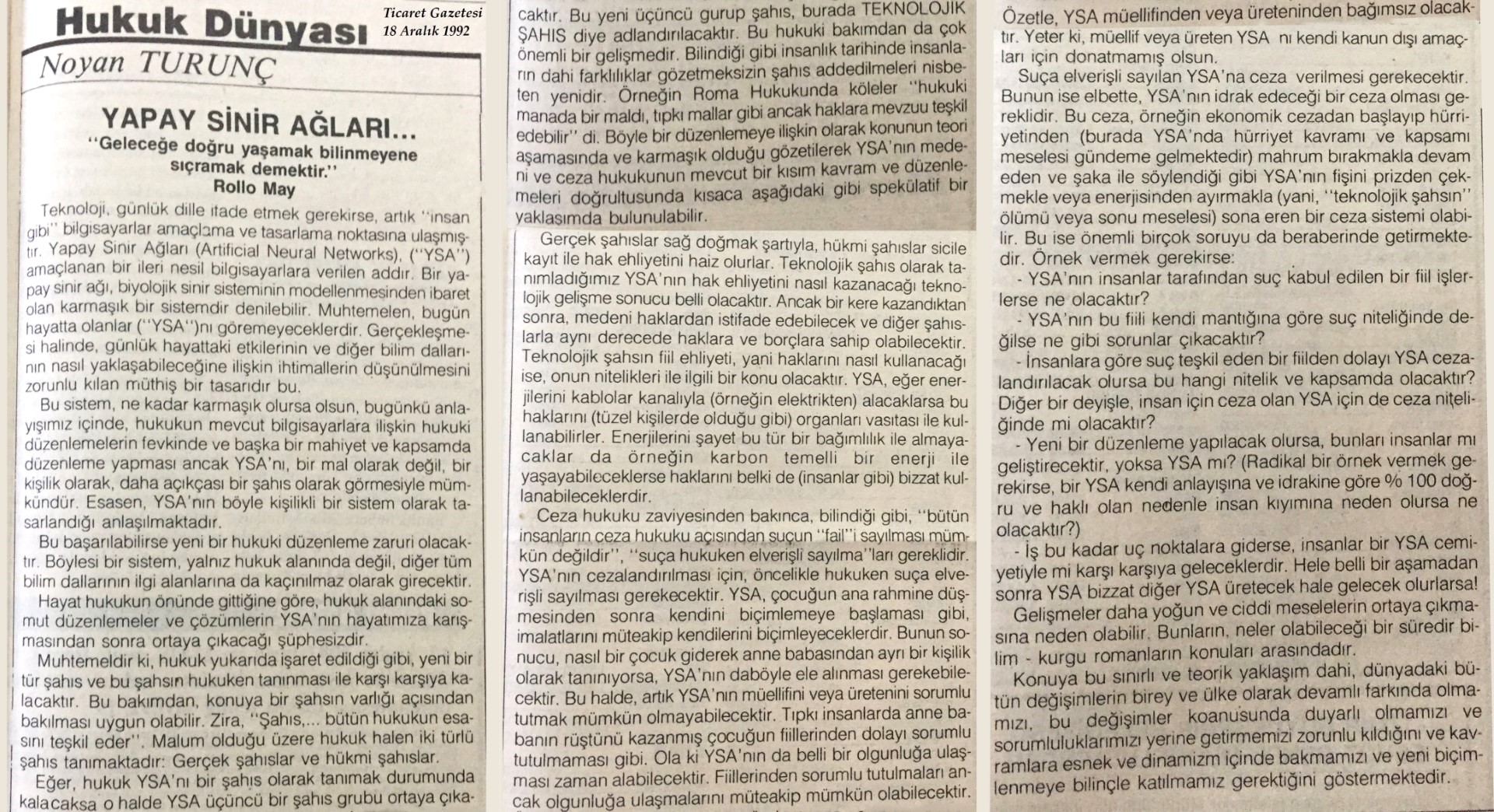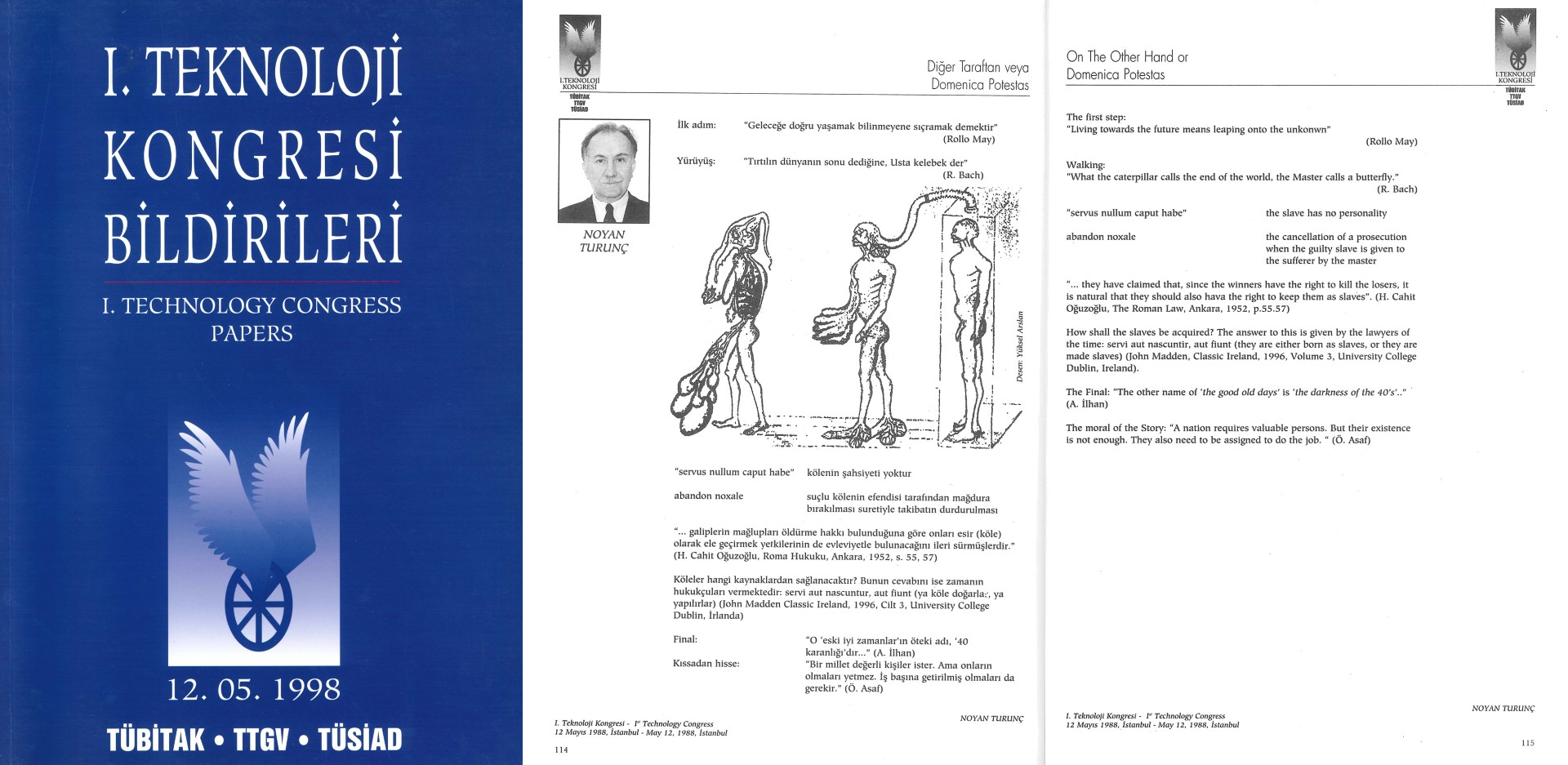Artificial Intelligence – 30+ Years Ago and Now (Chapter 1)
There is another secret, in addition to the ones we’ve solved!
There is another light, in addition to these lights.
Do not settle for anything you’ve done, go beyond;
There is another thing, in addition to all you’ve done.
– Omar Khayyam
With “artificial intelligence” hot on the agenda, we’ve recalled something.
Almost thirty-two years ago, on December 18, 1992, our founding partner Noyan Turunç published a column titled Artificial Neural Networks in Ticaret Gazetesi (Trade Newspaper). It wasn’t called “artificial intelligence” then.
In the column, referring to Rollo May’s quote “to live into the future means to leap into the unknown”, he said: the goal is to build “human-like” computers; the road to artificial intelligence is long.
If, as envisioned, artificial intelligence that can “behave independently like a human being” is to make its appearance in this world, he wrote, a third person, like the “natural person” and the “legal person”, would emerge, and its name could be, for example, “technological person”.
In short, if “technological person” can one day be created, it is still in its fetal stage.
Those interested can find the article below and its English translation at the bottom of this page:

All of the current developments and news today, and the excitement being pumped into society, are about the fetal stage of “artificial intelligence.” At this stage, it is a fetus that can be used technologically and commercially, with pecuniary gains at the end. Legally, it is merely property. It has not yet reached the stage of being legally recognized as a person.
Six years after the above column, i.e., over twenty-five years ago, on May 12, 1998, the First Technology Congress of Turkey, led by TÜBİTAK (Scientific and Technological Research Council of Turkey), TTGV (Technology Development Foundation of Turkey) and TÜSİAD (Turkish Industry and Business Association), was held. In the Social Development and Technology session, Noyan Turunç made a presentation titled “From the Other Side or Domenica Potestas.” The topic was the same: artificial intelligence. Those interested can find the summary below:

Good thing he wrote these pieces. Today, we’re observing that the discussions on artificial intelligence are being shaped in the same way as he projected.
Ticaret Gazetesi, 18 December 1992
ARTIFICIAL NEURAL NETWORKS…
“To live into the future means to leap into the unknown.”
Rollo May
Technology has now reached the point of aiming at and designing “human-like” computers, to use everyday speech. Artificial Neural Networks (“ANNs”) is the name given to the contemplated next generation of computers. An artificial neural network is a complex system constituting a model of the biological nervous system. Those who are alive today will likely not see ANN. This is a formidable project that requires us to think about its impact on everyday life and the possibilities of how other disciplines might approach it if it’s realized.
No matter how complex this system is, in our current understanding, it is only possible for the legal system to regulate it in a different nature and scope, beyond existing regulations on computers, is if it considers ANNs to be a personality as opposed to a commodity, more precisely to be a person. In fact, we understand that ANNs are being designed as a system with personality.
If this can be achieved, a new regulatory framework will be mandatory. Such a system will inevitably be of interest not only for the legal profession but also for all other disciplines.
Because life moves ahead of the law, there is no doubt that concrete legal regulations and solutions will emerge after the introduction of ANNs into our lives.
It is likely that the law will be confronted with a new type of person, as pointed out above, and the legal recognition of that person. In this respect, it may be appropriate to look at the issue from the point of view of the existence of a person. This is because “[p]erson … is the basis of all law.” As is well known, the law currently recognizes two types of persons: Natural persons and legal persons.
If the law will have to recognize ANNs as a person, then ANNs will create a third group of persons. This new third group of persons will be referred to herein as TECHNOLOGICAL PERSON. This is a very significant development in legal terms. As known, it is relatively new in the history of mankind that even human beings are considered as persons regardless of their differences. For example, in Roman Law, slaves were “property in the legal sense, and could only be subject to rights like property.” Regarding such an arrangement, considering that the issue is in a theoretical stage and complex, a speculative approach, as summarized below, can be made in line with some of the existing concepts and regulations of civil and criminal law.
Natural persons have capacity to hold rights by being born alive, and legal persons upon registration in a registry. How the ANN, which we define as a technological person, will acquire its capacity to have rights will be determined as a result of technological developments. However, once it acquires such rights, it will be able to benefit from civil rights and have the same rights and obligations as other persons. The technological person’s legal capacity, i.e., how it will exercise its rights, will be a matter of its qualifications. If ANNs receive their energy through cables (e.g., from electricity), they can exercise these rights through their organs (as is the case for legal persons). If they will not obtain their energy through such a dependency but will be able to live, for example, on carbon-based energy, they may be able to exercise their rights in person (like humans).
From a criminal law perspective, as is known, “it is not possible for all human beings to be considered ‘perpetrators’ of crimes in terms of criminal law”; they must be “deemed legally capable of committing a crime.” For ANNs to be punished, they must first be deemed legally capable of committing a crime. ANNs will shape themselves following their manufacture, just as a child begins to shape themselves after conception. As a result, just as a child is gradually recognized as a separate personality from his or her parents, ANNs may also need to be treated as such. In this case, it may no longer be possible to hold the author or producer of the ANN responsible. Just as in the case of human beings, where parents are not held responsible for the actions of their children who have come of age. In that case, it may take time for ANNs to reach a certain maturity level. It will only be possible to hold them responsible for their actions after they reach maturity. To summarize, ANNs will be independent of their author or producer as long as the author or producer has not equipped an ANN for their own unlawful purposes.
A penalty will have to be imposed on an ANN that is deemed capable of committing crime. This, of course, must be a punishment that the ANN can comprehend. This punishment could be, for example, a system of penalties starting with economic punishment, continuing with deprivation of liberty (which brings up the issue of the concept and scope of liberty of ANNs) and ending, as said in jest, with unplugging or de-energizing the ANN (i.e., the issue of the death or end of the “technological person”). This itself raises many important questions. For example:
– What happens if an ANN commits an act that is considered a crime by humans?
– If this act of the ANN is not a crime according to its own reasoning, what problems will arise?
– If the ANN is punished for an act that constitutes a crime for humans, what will the nature and extent of this punishment be? In other words, will a punishment apt for humans also be an apt punishment for the ANN?
– If there is new regulation, will it be developed by humans or by ANNs? (To provide a radical example, what will happen if an ANN causes human slaughter for reasons that are 100% right and justified according to its own understanding and comprehension?)
– If the matter goes to such extremes, will people be confronted with an ANN society? Especially if, after a certain stage, the ANN itself becomes capable of generating other ANNs!
Developments could lead to the emergence of more intense and serious issues. What these issues might be has been the subject of science fiction novels for some time.
Even this limited and theoretical approach to the subject demonstrates that it is imperative for us as individuals and as a nation to be constantly aware of all the changes in the world, to be sensitive to these changes and to fulfill our responsibilities, and that we need to look at concepts with a flexible and dynamic approach and consciously participate in the new shaping.
Noyan Turunç
